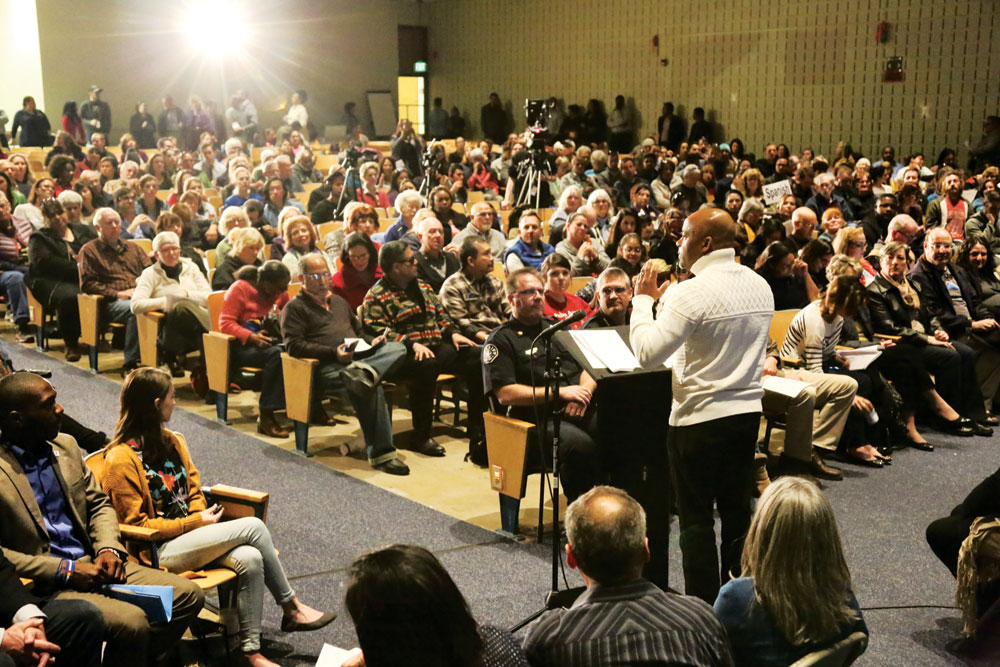
On. Feb. 11 Mayor Hancock held a community meeting to clearly state Denver’s position in the wake the president’s travel ban. Approximately 500 people attended the meeting held at Place Bridge Academy.
Based on concerns expressed by individuals and organizations in Denver following President Trump’s Jan. 28 travel ban, Mayor Michael Hancock gathered the city officials and top law enforcement officers for a community information session clarifying Denver’s policies. Place Bridge Academy, which works with newcomer immigrant and refugee students, offered their 650-seat auditorium—and concerned community members nearly filled it.
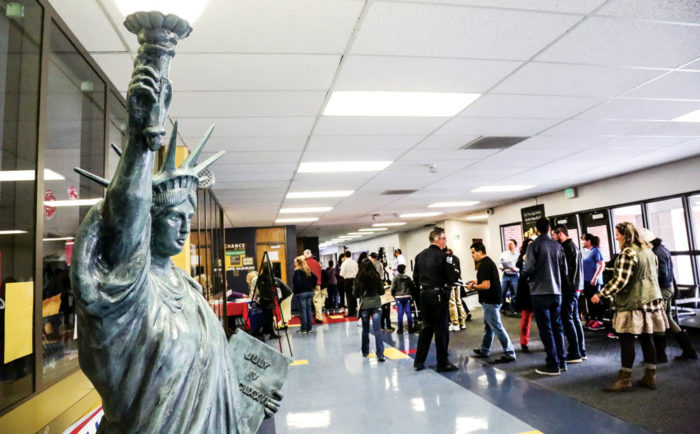
Place Bridge Academy is a Denver public school that serves newly arrived refugees and immigrants.
Hancock’s position, which received loud approval from the audience, was clear from the start, “We recognize that President Trump’s actions have wreaked havoc on this nation. We recognize that President Trump’s actions are void of acknowledging the humanity of the people he was talking about. The reason we’re here today is you’re worthy and you matter. And in Denver we’ll remain an open and inclusive and a city of opportunity.
“We will not become immigration law enforcement officers. Our officers will continue to serve and protect all residents of Denver regardless of where you come from. You’re in Denver now.”
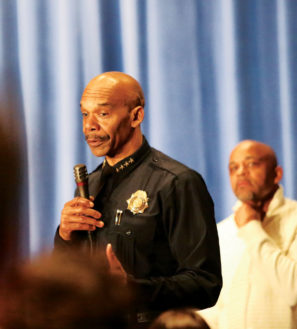
Denver Police Chief, Robert White
Acting U.S. Attorney Bob Troyer, in attendance with his wife and seven or eight volunteers from his staff (and some of their spouses), clarified the role of the U.S. attorneys’ 200-person office in Colorado: U.S. attorneys follow the law to protect people and prosecute those who hurt them under federal crime laws. For victims of a hate crime or a civil rights violation, it doesn’t matter if they are a citizen. Everyone in this country has rights under the constitution and civil liberties protection that are enforced by the U.S. attorney’s office.
Troyer clarified that the U.S. attorney’s office is not involved in immigration policy and does not assist in implementing deportation. But he strongly made the point that U.S. attorneys can only provide assistance and prosecute cases they know about—and they were there to answer individual questions after the group session.
Police Chief Robert White followed up on Troyer’s point that people need to communicate with law enforcement in order for them to do their jobs. “Denver police department does not do ICE work and has not done ICE work since Trump has been president. We do not detain or question individuals about their status. From a police perspective, it does not matter to us whether you’re documented or undocumented or a citizen or not. Everyone who is living or traveling in Denver is treated the exact same—and we do not work hand in glove with the federal government for deportation.”
ACLU Legal Director Mark Silverstein pointed out that not only does local law enforcement not have to participate in immigration enforcement, they, in fact don’t have the authority to arrest and enforce immigration laws. He went on to explain, however, that President Trump has changed the criteria for deportation. Previously people with serious legal convictions or people with a history of multiple convictions for less serious offenses were prioritized.“That has changed. New priorities include just about everyone. Just about all the 11 million without legal status in this country.”
Silverstein said President Trump has ordered a return to the “secure communities program” in which information on any arrest, even for the most minor offense, went to ICE. If ICE was interested in that person, they sent a detainer to the local sheriff. When the person was going to be released, the detainer asked sheriffs to keep holding the person to give ICE time to make the pickup. “Local law enforcement was working hand in glove with the deportation machinery of the federal government, which made people afraid to call the police when they needed help,” said Silverstein.
Three years ago the ACLU persuaded every sheriff in Colorado not to comply with immigration detainers, the first state in the country to cease cooperation with the secure communities program. Silverman says Sheriff Firman is “holding fast to that.” Sheriff Firman said they are doing what they have to do legally but nothing more than that. He explained that anyone can call and ask when someone will be released and they give that information to all callers.
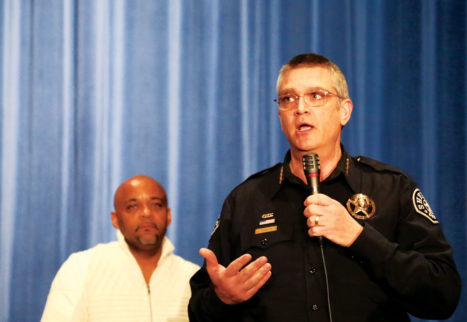
Denver Sheriff Patrick Firman
Will federal funds be withheld from Denver as a result of having sanctuary city policies? City Attorney Kristen Bronson said her office has taken a very close look at President Trump’s executive orders and they do not believe Denver is in violation and can have federal funds taken away. “If the federal government seeks to try to deny grants or take away federal funding based on the current executive orders as they’re drafted, we’ll file a lawsuit and fight that.”
Colorado receives about 2,000 refugees a year, with 25% of those placed in Denver. Denver’s Office of Immigrant & Refugee Affairs works with the newcomers on citizenship and provides referrals to non-profits and other government agencies. Jamie Torres, director of that office, says they meet the newcomers halfway, expecting the newcomers will do their part to get to know the community and make the integration process work.
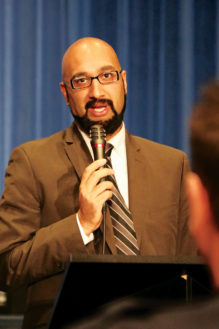
Qusair Mohamedbhai, legal counsel for Colorado Muslim Society
What can the community do to help? Qusair Mohamedbhai, legal counsel for the Colorado Muslim Society says fear and paranoia about Muslims and refugees is based on lack of knowledge. He suggests visiting a mosque and getting to know your Muslim neighbors. “And the next time you hear rhetoric that is hateful against Muslims, challenge it based on your own personal experiences with the Muslims in your community.”
The ACLU trains volunteer lawyers, who can sign up using a form on their website at ACLU-CO.org
Citizens can contact Jamie Torres to learn ways they can help: jamie.torres@denvergov.org or 720-913-8471.
As the event ended, DPS School Board member Barbara O’Brien announced the board was working on a resolution making clear teachers do not cooperate with ICE. The resolution, passed on February 16, says immigration law enforcement activities at schools interfere with students’ constitutional rights and states DPS will not collect information on students’ immigration status and will not provide access to students without a valid search warrant.



Not everyone agrees with allowing illegals to come in and stay here at will. It’s a drain on the economy, and they aren’t citizens, so they don’t have any reason to take pride in the United States or wish to see the interests of the United States advanced. If deporting illegals and preventing them from coming in drives up the price of food or other goods and services (or whatever argument liberals make to show that we need them), then so be it. I’ll gladly pay more. Shouldn’t we strive to pay quality wages anyway to workers anyway? We don’t need illegal immigrants, and if they’re here, they’re breaking the law. It’s plain and simple. Other lawbreakers are punished, and these should be too. Where do we start drawing the line when it comes to breaking the law? Breaking some laws is okay but not others? It’s insanity.